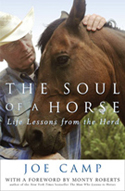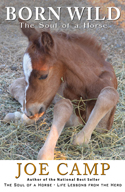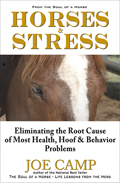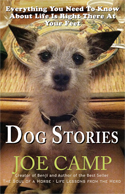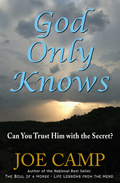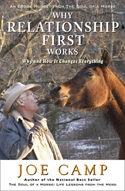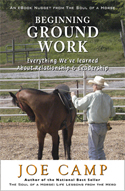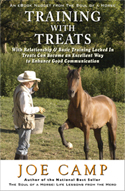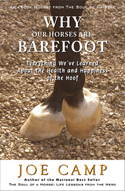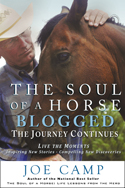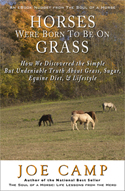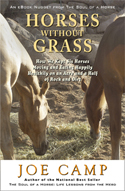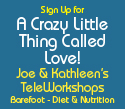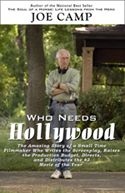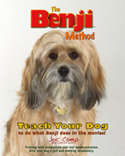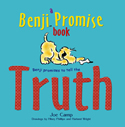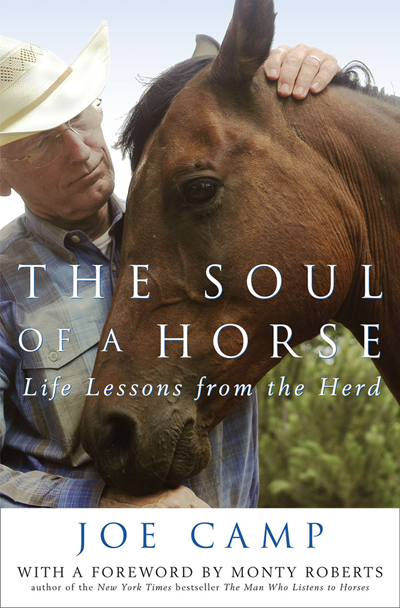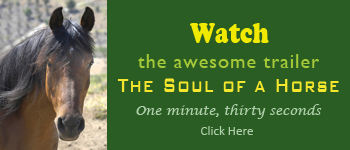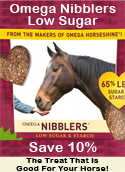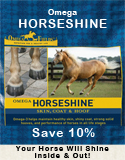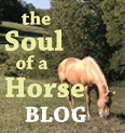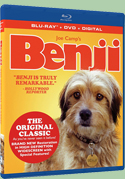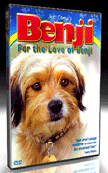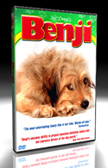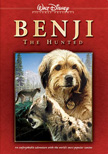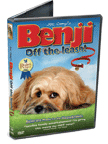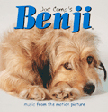Buy Now!
Amazon and Kindle
Order Personally Inscribed Copies
The New York Times calls Joe Camp “a master storyteller.” When he gets passionate about something it always winds up being woven into an engaging story so you will devour every essence and read it over and over again. He believes that horses love the opportunity to grow with you, and have fun with you… to learn new things and be rewarded in a positive way that they truly enjoy.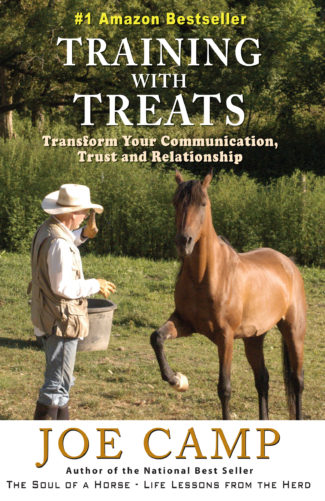 Joe’s words: I believe if you say to your horse: “Do something I like and I’ll do something you like” you will find that they will become the most willing of partners. I also believe that they love being able to speak to you, to initiate conversation. Like Cash does when he walks up and offers his big toothy smile, saying, Might I have a treat please?
Joe’s words: I believe if you say to your horse: “Do something I like and I’ll do something you like” you will find that they will become the most willing of partners. I also believe that they love being able to speak to you, to initiate conversation. Like Cash does when he walks up and offers his big toothy smile, saying, Might I have a treat please?
Many trainers dislike the use of treats for training. Some even say we shouldn’t talk to our horses. Training should all be based upon body language, just as the horses use with each other in the herd. We believe that the horse’s language is important because once the horse understands that you know his language, once you have given him the choice of trusting you, of being in relationship with you, and once you have proven your leadership to the horse then he has a clear capability to grow and understand our language. To learn things he might not have ever had the chance to learn if he had remained in a herd somewhere. Sort of like you grew when you went off to school.
Teaching your horse that you understand his herd language is a must in the beginning. But we now know that communication increases exponentially, both in comprehension and speed of learning, when treats are strategically used. I suppose it comes from so many years working with Benji before horses, and finally drawing the conclusion that whatever a dog can learn, a horse can learn as well because, with treats, they both want to learn.. And the horse will be just as happy about showing off as Benji is. Believe it or not, now all backed up by a new scientific study.
Now our horses have a way to speak to us, to initiate conversation. They stroll up and offer up a big wide smile, or a soft little kiss. And we realized that everything had changed. With traditional training, we humans are always the ones doing the talking. Telling the horse, one way or another, to do this or do that. Never do we ask or listen to what the horse might want. And for the most part we teach with negative reinforcement. Release of pressure. In other words we stop doing something that is uncomfortable for the horse when he does something we’d like him to do. And we call it a reward.
Positive reinforcement would be something that the horse considers… well, positive. Good. Desired. Even fun. You do something I like and I’ll do something you like.
Come with us as we step outside the box and discover how to give our horses a new and exciting way to learn, and communicate with us… and have fun!
Whoa! Hold on there. Have we stumbled onto something that actually teaches the horse and the horse enjoys it, thinks it’s fun?
Yes, we did.
Fun is a key word here because once basic natural training – what I call leadership training – of a horse has begun in earnest, after the horse has been given the choice of whether or not to trust us, to be in relationship with us, the work is all about maintaining leadership and relationship. And learning to communicate what we’d like the horse to do. So much typical training is based on the horse’s genetic desire to be safe and comfortable that the usual learning process is heavily slanted toward giving the horse the choice of either doing the behavior or being uncomfortable. Like the simple request asking the horse to lower his head. It’s either lower it, or feel the discomfort of halter pressure on top of your head.
The horse learns. There’s no pain or cruelty. But not much reasoning either. And not a whole a lot of fun. And the horse has no real choice in the matter. Respond appropriately or be uncomfortable. But with a treat, it’s all his choice. Nothing uncomfortable happens if he doesn’t do what has been asked. He’s perfectly free to ignore you completely.
At no other time, other than perhaps a frolic in the pasture, do we ever get to see the horse having fun. Especially while his brain is engaged and he’s learning.
Fun?
What’s that about?
Most folks grow up assuming that the horse’s capacity to reason and his ability to have fun are just not part of his genetic make up. And unfortunately those subjects just never come up.
Didn’t with us.
We never really thought about it. I was so focused on becoming one of the herd, using their language, directing them away from the reactive side of their brain, teaching them to move their various body parts as Clinton says, “backwards, forwards, left or right” – all of which is absolutely necessary to establishing a positive relationship with the horse, and necessary to clearly establishing my leadership role, which in the herd is based upon who moves who – that it just didn’t occur to me that a horse could grow into reason, much like a dog can. Or that the horse could develop a verbal vocabulary, like Benji. The caveat is that, with the horse, all the basic training must come first, because neither reasoning nor vocabulary will occur until the horse trusts you enough to stay on the thinking side of his brain, and respects you enough to choose you as a herd leader. And until you have lived up to that leadership role this means working from the horse’s end of the lead rope first. Understanding and using his language, and the way his herd dynamics work.
Without that there is no opportunity for communication in either language, his or ours. With or without vocabulary.
Unlike a dog, a horse is a a flight animal. Only when a horse knows that you understand his language and he has accepted you as his trusted leader will he feel safe and secure with you. Only then should you offer him the opportunity to now understand your language. To play the way you play. To learn the way you learn. Only then can he feel secure enough in his trust in you to truly embrace and understand these new ways and new things, and give himself fully to the effort.
But give himself he will.
My Cash learned to smile in about thirteen seconds, and now he uses it to start a conversation.
Might I have a treat please?
Never does he become a pest, nudging, digging into our pockets. He merely asks very politely with his smile. And he understands that no is an answer.
We have a routine that we follow when, for example, we’re at the end of a session and Cash asks for yet another treat. As I mentioned above, words, once learned, can be linked together in different ways, different phrases, even sentences and actual conversations. This is a terrific example of just that. Say we’re wrapping up a session and Cash lays his big toothy smile on me.
Just one more treat. Puleeze!
I’ll usually harrumph a bit, and then say:
“Well… alright. Just one more. Okay? Just …one …more.”
Another big smile.
I give him a treat.
And he actually turns and walks away.
Conversation over.
And it always leaves me smiling.
Cash also bows, both with me and to me. He waves with one foot and no matter which one he waves with first will switch when asked to wave with the other foot (actually understanding the concept of other). He flexes laterally, touching his rib cage on both sides, with no halter or lead rope. With the word up he’ll raise his head,,, or lift his lip higher if he’s smiling… or his leg if he’s waving. He understands the words walk with me, down, move, wave, higher, out, go on, come, back up, go sideways, and more.
All taught when he was completely at liberty, using treats.
Side note: we use Omega Fields’ Omega Nibblers Low Sugar & Starch treats, the only treat I’ve found that is actually good for my horse. They are great tasting and a functional source of plant derived Omega 3 with the best ratios of natural Omega 9 and Omega 6, made from 99.9% pure Non-GMO stabilized fortified ground flaxseed and natural ingredients. That’s .9% higher than required for human food grade. Nobody else does this. And there’s no sugar or molasses, no corn or other grains that turn to sugar immediately upon entering the body, and no soy or hydrogenated fats or oils. With an extremely low NSC of 14.1. This is an amazing treat! Omega Fields recommends 15 treats a day as an Omega 3 supplement so I never feel guilty or worried about over-training.
You do something I like and I’ll do something you like.
And it’s all so much fun for both of us.
And all so much fun for both of us.
With this book we share it all with you.
With free Kindle apps, download this book to your computer, iPhone, Android, Blackberry, iPad, Kindle, or all of the above for one teeny little price! The stories you love and the information you need will always be with you.
Read More
Download Flyer
Buy ’em – Try ’em
Save 10% by clicking this link
and using the coupon code JOECAMP10 at checkout
Send a copy of your Omega Nibblers email purchase confirmation to
nancy@thesoulofahorse.com
and receive a free PDF copy of Training with Treats!
Training with Treats
To pause a photo, hover your “mouse” over it.
Note the absence of halter and lead.
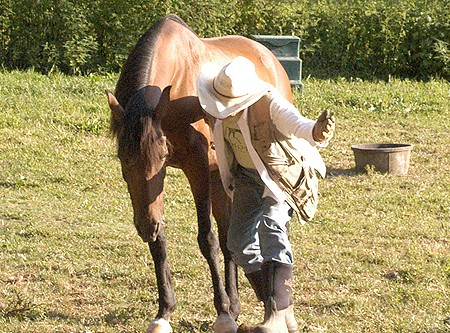
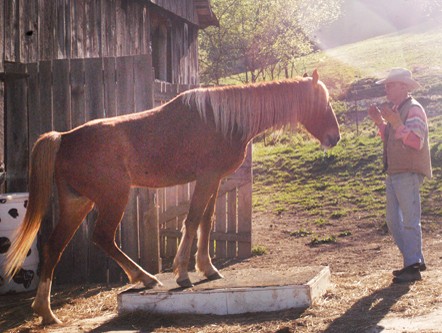
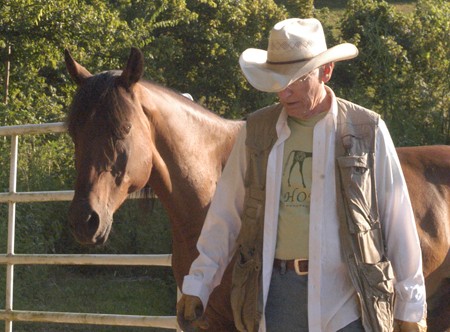
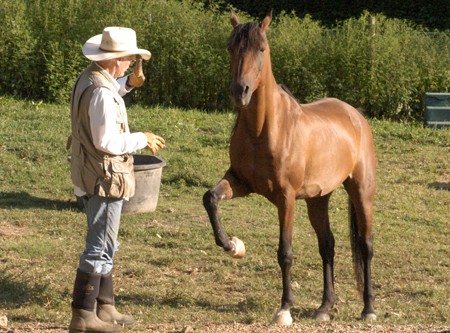
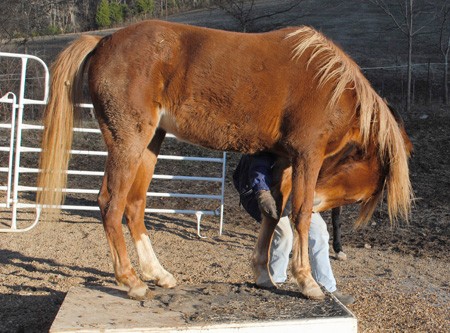
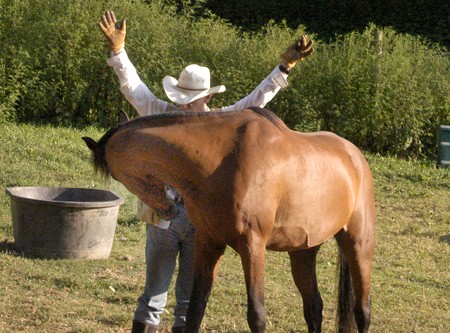
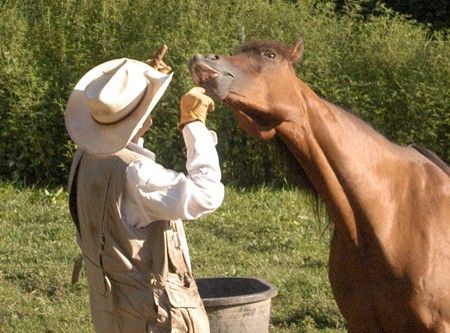
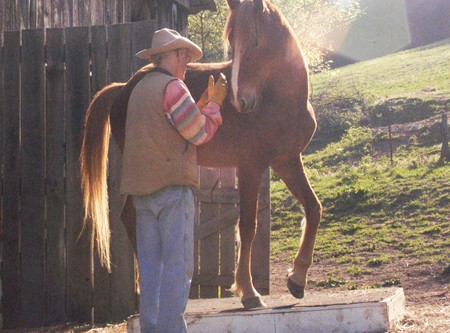
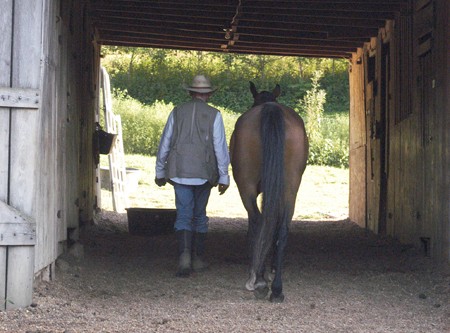
Buy Training with Treats on Amazon and Kindle
Order Personally Inscribed Copies of Training with Treats – $6.99
——-
Go to TheSoulOfaHorse.com Homepage
The Soul of a Horse Video Channel on Vimeo
Visit The Soul of a Horse Channel on YouTube
——-
The story of our journey with horses (to date) is told in the two books that follow: the national best seller The Soul of a Horse – Life Lessons from the Herd and its sequel Born Wild – The Soul of a Horse.
And what a story it is as two novices without a clue stumble and bumble their way through the learning process so that hopefully you won’t have to. If you haven’t read both of these books already please do because with that reading, I believe, will come not just the thrill of a good story well told but the knowledge of discovery and the passion and excitement to cause you to commit to your journey with horses and do for the horse without waiver, to let it be his choice whether or not to trust you, so that your relationship and experience will be with loving, happy and healthy horses who are willing partners and who never stop trying for you.
Read the National Best Seller that started it all.
The relationship that changed the world for horses.
Now in its 17th Printing
National Bestseller
#1 Amazon Best Seller
#1 Amazon “Hot New Releases”
Buy Now!
Amazon & Kindle
Order Personally Inscribed Copies of The Soul of a Horse
Order Both The Soul of a Horse & Born Wild – Save 20%
Both Personally Inscribed
Please list the names for each inscription in the “instructions to Seller” field as you check out!
Read More About The Soul of a Horse
Watch The Soul of a Horse Trailer
The highly acclaimed best selling sequel
The Journey Continues
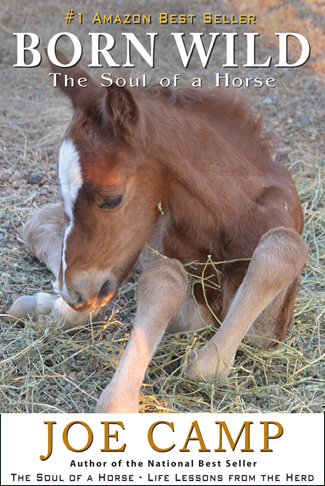
#1 Amazon Best Seller
#1 Amazon “Hot New Releases”
Amazon & Kindle
Order Personally Inscribed Copies of Born Wild
Order Both The Soul of a Horse & Born Wild – Save 20%
Both Personally Inscribed
Please list the names for each inscription in the “instructions to Seller” field as you check out.
“Joe Camp is a master storyteller.” – The New York Times
“One cannot help but be touched by Camp’s love and sympathy for animals and by his eloquence on the subject.” – Michael Korda, The Washington Post
“Joe Camp is a natural when it comes to understanding how animals tick and a genius at telling us their story. His books are must-reads for those who love animals of any species.” – Monty Roberts – Author of New York Timers Best-seller The Man Who Listens to Horses
“Camp’s tightly-written, simply-designed and powerfully drawn chapters often read like short stories that flow from the heart.” Jack L. Kennedy – The Joplin Independent
“Joe Camp is a gifted storyteller and the results are magical. Joe entertains, educates and empowers, baring his own soul while articulating keystone principles of a modern revolution in horsemanship.” – Rick Lamb – TV/Radio host – The Horse Show
——-
Go to TheSoulOfaHorse.com Homepage
The Soul of a Horse Video Channel on Vimeo
Visit The Soul of a Horse Channel on YouTube















